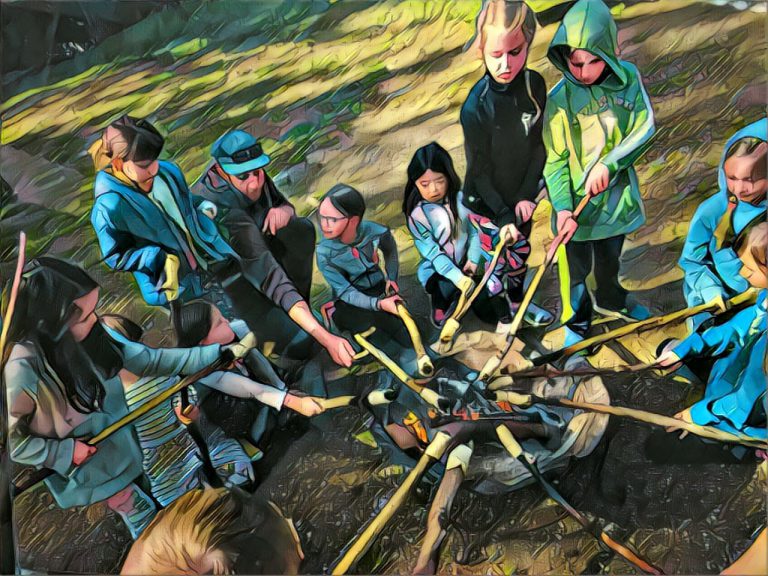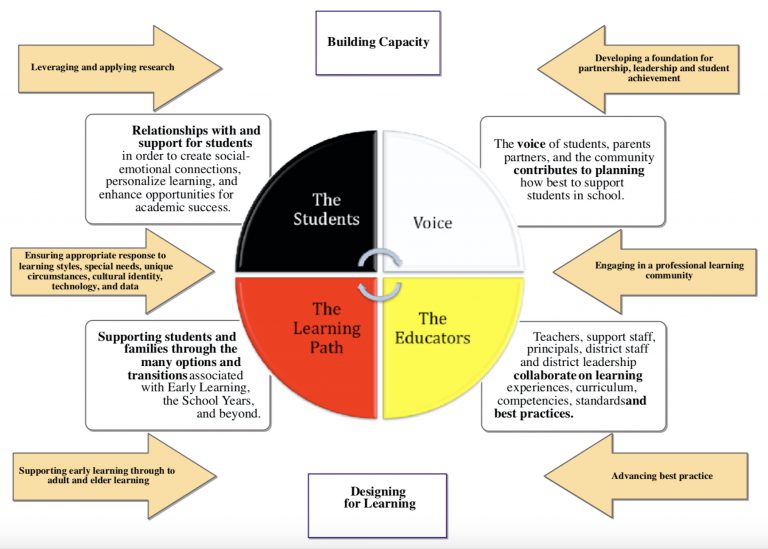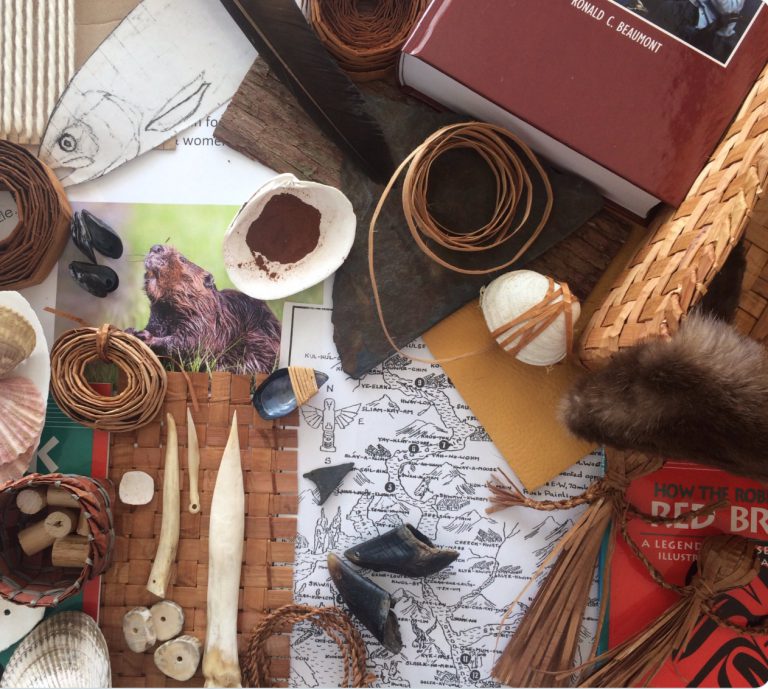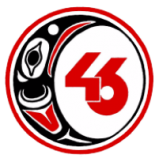Indigenous Learning Support

District Indigenous Education Support Teachers develop relationships with students with Indigenous ancestry, their families and their teachers in order to provide support to them and create social-emotional connections, personalize their learning, and enhance opportunities for academic success.
We say that our work takes us in Four Directions:
• The Students
• Respect and Honour the Voice of First Nations, Métis and Inuit Families/Communities
• The Educators
• The Learning Path

We use the following stars to guide us: Culture • Vision • Partnership • Responsiveness • Success • Relationship
What We Do
Indigenous Education Support Teachers serve students and families as facilitators, teachers, keepers, mentors, witnesses, advocates, speakers and collaborators.
The Students
Develop relationships with and support for students with Indigenous Ancestry in order to create social-emotional connections; a sense of respect, presence and belonging; personalize their learning; and enhance opportunities for academic success.
Provide Indigenous Language and Culture experiences for learners with Indigenous ancestry and offer cultural experiences for all learners.
• Through research and by consulting with Indigenous students, parents and colleagues, identify the barriers and foundations to student success.
• Co-design learning plans with school staff and families to enhance chances for success for Indigenous students.
• Ensure a culturally respectful and appropriate response to a student’s need for intervention.
• Collect, share, analyze, set goals and take action to support students based on achievement data.
• Encourage cultural pride and sharing among students/in schools.
• Offer cultural teachings and facilitate visits from knowledge keepers and elders in elementary and secondary classrooms.
• Offer one to one and small group learning support in classrooms.
Respect, Honour, Voice
The voice of students, parents, and the communities guide how best to support Indigenous students in school.
Respond to the Truth and Reconciliation Calls to Action and the BC Declaration on the Rights of Indigenous Peoples Act
• Form and maintain an Indigenous Education Advisory Circle that reflects the First Nations, Métis and Inuit parent, student and education community.
• Regularly consult student, parents and the Indigenous communities.
• Develop and maintain a foundation for partnership, leadership, and self-determination for students and the community.
• Collect and share information; co-design and support planning and action based on achievement data.
• Hold up and promote Language, Cultural Knowledge, Protocol and Ceremony.
The Educators
With classroom teachers, support staff, and school/district leadership, collaborate on enhancing learning for Indigenous and all students.
Collaborate on inclusion, supporting diversity, and the implementation of the curriculum.
• Engage in a cultural and professional learning community.
• Encourage culturally respectful and responsive design of learning experiences.
• Collect, advise on, and assist with access to digital, print and human resources for students and teachers.
• Advance best educational practises and build collective efficacy.
• Based on consultation and data, set goals, co-design and support planning/enhancement action based on achievement data.
• Support the District Strategic Plan goals.
• Model instructional approaches for colleagues: through co-planning, teach and co-teach in classrooms.
• Co-plan and collaborate on learning support/interventions.
• Co-plan and collaborate on curriculum implementation
The Learning Path
Support students and families through the stages of learning and accessing options associated with Early Learning, the School Years, and beyond.
• Support early learning through to adult learning initiatives for Indigenous students and families.
• Engage in information sharing and counselling towards post-secondary learning and work opportunities.
• Initiate exploration experiences that spark a vision of one’s own future and that of the community – and a path to get there.

The People Who Support Indigenous Students
Indigenous Learning Programs and Services Staff (SD46 Employees)
District Principal, Indigenous Learning
Kerry Mahlman cmahlman@sd46.bc.ca cell 604 885 8345
Administrative Assistant, Indigenous Learning
Maria Mcmullen mmcmullen@sd46.bc.ca 604 886 3741 (Tue-Wed-Thu)
• She sháshishálhem (Sechelt) Language and Culture Program
Rita Poulsen, sháshishálhem Teacher
Kinnikinnick, Chatelech, Sunshine Coast Alternative
• District Indigenous Education Support Program Teachers
Gus Guzek gguzek@sd46.bc.ca 778-677-7148
Langdale, Gibsons, Cedar Grove, Roberts Creek
Lindsay Benger lbenger@sd46.bc.ca 604-741-7667
West Sechelt, Kinnikinnick, Davis Bay, Halfmoon Bay
Lisa Allen lallen@sd46.bc.ca 604-885-8431
Elphinstone, SCAS, Chatelech
Shannon Lloyd slloyd@sd46.bc.ca 403-560-7275
Madeira Park, Pender Harbour
• District Indigenous Student Success
Tammy Saigeon, Indigenous Student Success Teacher tsaigeon@sd46.bc.ca 604-740-1500
All secondary schools; when needed in elementary schools
Transitions to secondary and to post-secondary/training/work for Indigenous students in care
• District English Language Development (ESD)
Lisa Kennedy, Morningside Numeracy/Literacy and ESD Program lkennedy@as46.bc.ca 604-741-7394
Kinnikinnick
• District Indigenous Support Workers (SD46 Employees)
Kate-Lynn Dixon and Michelle Dixon: Chatelech. office: 604-885-3216
Debralee Paul: Kinnikinnick office: 604-885-6666
• District Indigenous Youth Workers (SD46 Employees Supporting All Indigenous Students)
Charly McLean cmclean@sd46.bc.ca 604-741-3336
Asepn Wing awing@sd46.bc.ca 604-399-9719
shíshálh Nation Support (shishalh Nation Employees)
Executive Assistant for Education Director
Tracy Kelly (604) 885-2273 tkelly@shishalh.com
Education Manager, Education Department, shishalh Nation
Andrea Paul 604-885-9404 andreapaul@shishalh.com
• Teaching Assistants
Pauline Feschuk Kinnikinnick
Trent Dixon Kinnikinnick
Darren Dixon Chatelech
• Language and Culture Teaching Assistants
Leah Julius Chatelech and Kinnikinnick
Andy Johnson Chatelech and Kinnikinnick
• Education Case Workers
Katie Hopkins grade 10 – 12 Sec Schools khopkins@shishalh.com
Stefanie Block grade 8-10 Secondary Schools
Sandra Lipscombe gr. 5-8 Elem. and Sec. Schools 604-399-9377
Holly Neate grade K-4 Elementary Schools. 604-399-9104
• Post Secondary Education, Training and Employment
Ashley Charleson, Manager (604) 885-9404
• Family Support
Shyanne Georgeson, Family Support Worker (604) 885-9404
• Adolescent Mental Health Worker
(604) 885-9404

Contents of shishalh culture baskets created by Jessica Silvey and Robert Joe
Please feel free to contact us with questions or comments:
Kerry Mahlman
District Principal
Indigenous Learning
School District No. 46 (Sunshine Coast)
Phone: 604 885 8345
cmahlman@sd46.bc.ca

